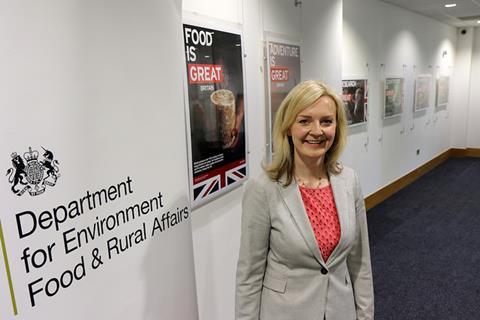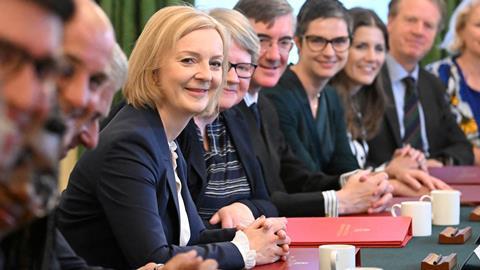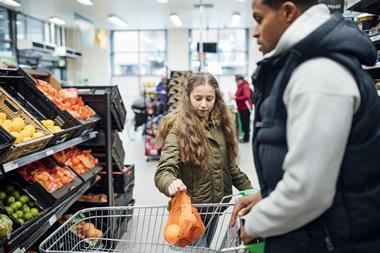Liz Truss has pledged to support farmers with labour and reduce nannying on the health and regulatory fronts. Will her Cabinet deliver?
New PM Liz Truss promised “we will deliver, we will deliver, we will deliver” on “a bold plan to cut taxes and grow our economy” following her election as Tory leader on Monday.
That was followed on Thursday by the unveiling of her signature plan for cutting energy bills.
So, when it comes to supporting the food sector, what can we expect from the new PM?
Energy:
As The Grocer went to press on Thursday, Truss announced moves to cap business energy bills for six months to avoid companies going to the wall in the winter.
She said the financial support would be “equivalent” to the support announced for consumers, which will see household bills capped at £2,500 a year, and is set to cost £150bn.
Truss said new business secretary Jacob Rees-Mogg would lead a consultation with businesses to be completed in the next three months, to offer companies with further certainty.
Beyond the six months, support would focus on “vulnerable industries”, with Truss naming hospitality as an example, though food production was not mentioned.
Industry bodies welcomed the announcements but called for clarity on how the intervention would work.
Who is in and who is out?
The key Cabinet appointments for the food sector are…
Department for the Environment, Food & Rural Affairs: Liz Truss loyalist and free trade evangelist Ranil Jayawardena has replaced Rishi Sunak supporter George Eustice as Defra secretary of state
Department for International Trade: Former leadership candidate and Tory rising star Kemi Badenoch replaces Anne-Marie Trevelyan as international trade secretary
Department of Health & Social Care: Key Truss ally Thérèse Coffey (who has also been appointed deputy PM) succeeds Steve Barclay’s short tenure
Department for Business, Energy & Industrial Strategy: Climate change sceptic Jacob Rees-Mogg succeeds new chancellor Kwasi Kwarteng at BEIS, and has been given a brief to tackle the energy crisis
Food production and trade:
As an ex-Defra secretary, Truss has so far made all the right noises when it comes to backing food and farming.
In an online hustings with the NFU last week, she broke with the previous government’s reluctance to increase the seasonal worker visa scheme’s 40,000 cap by insisting “we need to expand” it. She then took aim at a Home Office seen as obstructive on the matter by stressing she would “make sure” it engaged on the issue.
Given Defra was still insisting as late as last week it had already bent over backwards on the issue, Truss’s pledge marks a significant u-turn on ex-home secretary Priti Patel’s insistence businesses should wean themselves off “cheap foreign labour”. The comments were warmly welcomed by NFU president Minette Batters – as was Truss’s point the government “needed to do more to enable farmers to grow more food”.
The NFU has laid out a list of six priorities for the new PM, including the need for a “statutory underpinning of food production to maintain current levels of self-sufficiency”, though Truss was also keen to stress last week she was not in favour of “Soviet-style top-down targets on food production”.
Questions have also been raised over Truss’s choice of loyalist and former trade minister Ranil Jayawardena as her new Defra secretary. Writing in The Grocer this week, Ian Wright, outgoing chair of the Food & Drink Sector Council, echoed the views of many insiders that free marketeer Jayawardena “is in place to avoid conflict with DIT, keep the farmers quiet and the food flowing”.
Or as Sam Lowe, a partner at trade policy advisory firm Flint Global put it on Twitter this week, Jayawardena’s appointment “neutered” Defra as an internal constraint within government on UK trade objectives.
There are further questions over Truss’s next move on Northern Ireland. Will she rip up the protocol, threatening a trade war with the EU? The US warned on Thursday that “would not create a conducive environment for [trade] talks”.

Health policy:
People wanted the government to deliver on issues such as transport, public services, broadband and cutting NHS waiting lists, rather than “telling them what to eat”, said Truss in her leadership campaign. Will she now put this into practice?
Truss has already suggested she will bin the already-delayed ban on multibuy deals, such as bogofs, but some supplier sources are hopeful of a much wider rowback on the government’s HFSS plans – even though October’s ban on location promotions is weeks away.
“What we don’t know is whether she is just talking about bogofs because that’s the term she knows, or does she mean scrapping the whole lot?” asks one supplier source.
If it’s the latter, then not only could there be a last-minute reprieve for confectionery aisle and aisle-end HFSS promotions, but it could also be curtains for the long-proposed junk food advertising watershed and online ban, which like the multibuy issue has already been shelved for a year.
Truss’s appointment will also give fresh hope to those who want the government to bin its soft drinkssugar tax and appears to make it even more unlikely the government will follow Henry Dimbleby’s National Food Strategy suggestions of bringing in further taxes on salt and sugar.
Yet, as a fellow so-called anti-nanny state politician Boris Johnson found, there was a huge difference between appealing to Tory hawks and fighting a war on obesity. Truss will not only face a huge outcry from health campaigners if she rows back on HFSS, but also the wrath of retailers who have already spent millions preparing for the changes.
And to add to her considerations, Scotland’s first minister Nicola Sturgeon this week forged ahead with her own plans on HFSS deals. Will Truss still think it best to ignore her?
Regulation bonfire:
It’s not just on HFSS regulations where many industry sources hope Truss will live up to her reputation as a fan of the “smaller state”.
With a tidal wave of regulation on the horizon, including a huge new burden on business in the form of extended producer responsibility (EPR), due in 2024, plus the deposit return scheme (2025) and plans for a new national data partnership under discussion, sources argue there are levers Truss could pull to reduce the costs on businesses, aside from taxation.
FDF boss Karen Betts claims EPR alone will see food bills rocket by a further £60 a year, the equivalent of 12 days of food for the average family.
Business rates:
After years of failed promises by predecessors at No 10, could Truss finally make good plans to reform rates? None so far have been able to come up with an alternative to the increasingly archaic system.
BRC director general Helen Dickinson says an immediate freeze on the business rate multiplier for a year would be a signal Truss “means business”.
Given his previous government role of improving efficiency, tackling this long-standing gripe of businesses could make or break new business secretary Jacob Rees-Mogg’s tenure.




















No comments yet